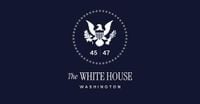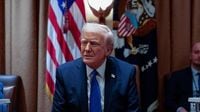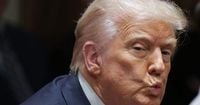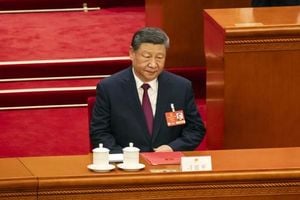In a series of significant political maneuvers on March 25, 2025, President Donald Trump took decisive actions aimed at fortifying the integrity of U.S. elections, while grappling with controversies surrounding his administration's communications practices and foreign trade implications.
Trump's recent executive order articulates a determined focus on enforcing election integrity standards. Within the order, he pointedly criticized the current laxity in regulating voting procedures, asserting, "After discussions with senior advisers, I believe it is critical for our democracy to strengthen our election integrity. We must ensure that every vote counts and that our electoral processes are protected against fraud and interference." He argued that the U.S. is lagging behind other nations, such as India and Brazil, which utilize biometric databases for voter identification and Germany, which mandates public counting of paper ballots, to stabilize the integrity of their elections.
According to the order, the Election Assistance Commission is mandated to require documentary proof of U.S. citizenship in national mail voter registration forms, reinforcing Trump’s dedication to a security-first approach in electoral practices. These measures come in response to his administration’s accusations of widespread election fraud, a claim that has persisted since the controversial 2020 elections.
On the same day, Trump publicly endorsed national security adviser Michael Waltz amid scrutiny related to a high-profile breach of communication. The incident involved a group chat on the Signal messaging app that inadvertently included a journalist amidst discussions of sensitive military plans regarding Yemen. In light of this breach, Trump asserted, "I support Mike Waltz; he’s a good man, and this issue will be resolved," reinforcing confidence in his adviser even as the administration faced public skepticism about its intelligence and security protocols. This incident has sparked bipartisan discussions during a Senate Intelligence Committee hearing, where cabinet members provided testimonies about the mishap.
In stark contrast to the domestic policy shifts, Trump's decision to impose a potential 25% tariff on goods entering the U.S. from countries importing Venezuelan gas or oil has raised alarm bells, particularly regarding its potential repercussions on the Indian economy. As the world's third-largest consumer of crude oil, India imports a significant percentage of its petroleum needs—drawing heavily from Russia and other nations, but also from Venezuela. With India having resumed buying Venezuelan crude after a period of sanctions, trade analysts warn that such tariffs could severely disrupt energy supplies and escalate diplomatic tensions.
Currently, India imports approximately 4.5 million barrels of crude oil daily and has seen its Venezuelan imports increase to over 250,000 barrels per day since early 2024. This interdependency illustrates the precarious balance of international relations that could be at stake with the proposed tariffs, stating that "the repercussions could be disastrous for the Indian economy," affecting energy prices and trade agreements.
While Trump's domestic initiatives draw considerable attention, legal struggles intensify as the American Association of University Professors and the Middle East Studies Association filed a lawsuit aimed at blocking the administration's efforts to target and deport international students and faculty involved in pro-Palestinian protests. This legal challenge underscores ongoing debates regarding freedom of speech and the rights of students within academic institutions. A federal judge recently issued a temporary restraining order preventing the administration from executing deportations in these instances.
Additionally, the Trump administration continues to draw scrutiny for its cuts to federal programs aimed at tracking domestic terrorism and violence prevention. Critics argue that halting funding for databases that track hate crimes and domestic violence directly undermines public safety, expressing concern about the administrative focus on border security at the expense of citizen protection.
Overall, the series of actions by the Trump administration on this day reflect a tension-filled landscape—one where election integrity, national security, international trade, and social justice intersect. As more politicians, activists, and citizens weigh in on the implications of these policies, it becomes increasingly crucial for the American public to remain engaged in the discourse surrounding governance and their rights.







